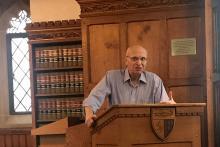What Is It
Lawyers are often thought to be hardly better than hired guns, who, in the words of Plato, are paid to "make the weaker argument the stronger" -- like the sophists of old. In fact, lawyers are legally and morally bound by stringent codes of ethics. Noted philosopher of law David Luban of Georgetown University is the guest as Philosophy Talk explores the ethical obligations of lawyers to their clients, to the court, and to society at large.
Listening Notes
John and Ken begin by discussing the common conception of lawyers as ethically challenged and morally reprehensible. John discusses his family's relationship to the law and the respect he has for both lawyers and the legal system, although he acknowledges there are bad apples in the profession. Ken gives the example of a defense witness zealously cross-examining a rape victim. Is this kind of activity ethical? What does the code of ethics for lawyers say? What does human morality require? Are these in conflict? How far can a lawyer go in contemporary times?
In order to answer some of these questions, Ken introduces David J. Luban, Frederick J. Haas Professor of Law and Philosophy from Georgetown University. John begins by asking David what the ethical rules that lawyers impose upon themselves, and whether they differ for different kinds of lawyers. David responds that despite the negative stereotype of lawyers, they impose a strict rule upon their profession never to lie, deceive, or misrepresent themselves. In the court room, the lawyer is supposed to be a zealous representative for their client, and should do whatever is within the bound of the law to help them win, ignoring all other interests. There are also rules about confidentiality and future crimes, but John pushes the conversation towards deception inside and outside of the courtroom. Luban points out that lying anywhere is discouraged, and notes that Bill Clinton lost his law license for this very reason.
Ken points out that there is a big difference between lying and not vigorously seeking the truth, and wonders: since the legal system is about ascertaining the truth, why isn't everyone in the courtroom concerned with finding the truth, instead of just not lying? David discusses our "adversarial" tradition and John asks about some alternative systems that are used in similar societies in South America and continental Europe. Ken steers the discussion away from these inquisitorial systems to the American adversarial tradition, and asks Luban whether or not there is a deep philosophical justification for this structure, and if not, why don't we change it? David Luban defends the adversarial tradition by using similar arguments to those put forward by Karl Popper: in order to arrive at the truth it is necessary to propose bold conjectures and then attempt to refute them. In this way opposing lawyers in America refute each other and end up with a more accurate view of what really happened. Luban thinks that this is a great idea in some scenarios, like theoretical points of law, but in trial situations the system leads to negative results.
John, Ken, and David further discuss a lawyer's role in helping the accused "escape punishment" and also take calls from the listening audience ranging from bad lawyer stories, moral martyrhood, the respect for dignity and self-incrimination in contemporary law.
- Roving Philosophical Report (Seek to 4:21): Zoe Corneli discusses the brutal reality of the courtroom and the moral code of public defenders with a Law Professor who spent many years defending rape and other brutal crime defendants.
- Conundrum on Justice, Jury Duty, and Abusive Relationships (Seek to 47:15): John and Ken help an Oregon schoolteacher deal with an interesting case he deliberated upon while sitting on a jury.




Comments (1)
Alyssa
Thursday, February 29, 2024 -- 5:15 AM
As a legal scholar, IAs a legal scholar, I underscore the paramount importance of legal ethics in upholding the integrity of the legal profession. Adhering to ethical principles is not just a brain injury attorney near me moral obligation but also a cornerstone of maintaining public trust and confidence in the justice system. Legal professionals must continuously prioritize ethical conduct to ensure justice for all.